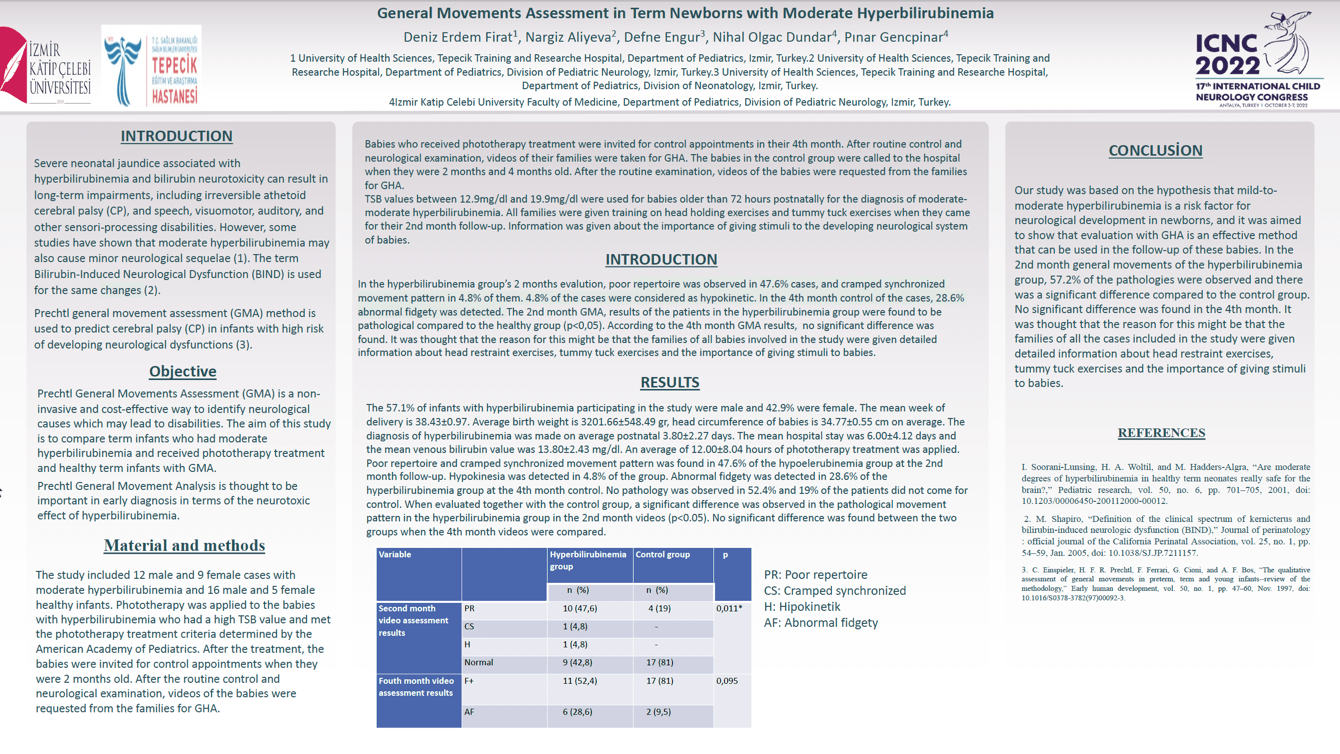General Movements Assessment in Term Newborns with Moderate Hyperbilirubinemia
Deniz Erdem Fırat, Nargiz Aliyeva, Defne Engur, Nihal Olgac Dundar, Pinar Gencpinar
Objective: Prechtl General Movements Assessment (GMA) is a non-invasive and cost-effective way to identify neurological causes which may lead to disabilities. The aim of this study is to compare term infants who had moderate hyperbilirubinemia and received phototherapy treatment and healthy term infants with GMA. Material and Methods: The study included 12 male and 9 female cases with moderate hyperbilirubinemia and 16 male and 5 female healthy infants. Video records were taken for General Movements Assessment when the subjects were 2 months and 4 months old. Results: In the hyperbilirubinemia group’s 2 months evalution poor repertoire was observed in 47.6% and cramped synchronized movement pattern in 4.8%. And 4.8% of the cases were considered as hypokinetic. In the 4th month control of the cases, 28.6% abnormal fidgety was detected. The 2nd month GMA results of the patients in the hyperbilirubinemia group were found to be pathological compared with the healthy group (p<0,05). According the 4th month GMA results no significant difference was found. Conclusion: In the 2nd month evalution we obtain a statistically significant GMA result that was not found in the 4th month. When the cases’ 2nd month follow-up, families were informed about head holding and tummy time exercises and the importance of stimulus to the babies. This may be the reason why there was no significant difference in the 4th month GMA. Moderate hyperbilirubinemia can cause minor neurological dysfunction. Using Prechtl’s GMA can be beneficial to evaluate and follow these babies with GMA and to intervene early.
Keywords: Hyperbilirubinemia, phototherapy, term, newborn, General Movements Assessment
Deniz Erdem Fırat
University of Health Sciences, Tepecik Training and Researche Hospital
Turkey
Nargiz Aliyeva
University of Health Sciences, Tepecik Training and Researche Hospital
Turkey
Defne Engur
University of Health Sciences, Tepecik Training and Researche Hospital
Turkey
Nihal Olgac Dundar
Izmir Katip Celebi University Faculty of Medicine
Turkey
Pinar Gencpinar
Izmir Katip Celebi University Faculty of Medicine
Turkey
Objective: Prechtl General Movements Assessment (GMA) is a non-invasive and cost-effective way to identify neurological causes which may lead to disabilities. The aim of this study is to compare term infants who had moderate hyperbilirubinemia and received phototherapy treatment and healthy term infants with GMA. Material and Methods: The study included 12 male and 9 female cases with moderate hyperbilirubinemia and 16 male and 5 female healthy infants. Video records were taken for General Movements Assessment when the subjects were 2 months and 4 months old. Results: In the hyperbilirubinemia group’s 2 months evalution poor repertoire was observed in 47.6% and cramped synchronized movement pattern in 4.8%. And 4.8% of the cases were considered as hypokinetic. In the 4th month control of the cases, 28.6% abnormal fidgety was detected. The 2nd month GMA results of the patients in the hyperbilirubinemia group were found to be pathological compared with the healthy group (p<0,05). According the 4th month GMA results no significant difference was found. Conclusion: In the 2nd month evalution we obtain a statistically significant GMA result that was not found in the 4th month. When the cases’ 2nd month follow-up, families were informed about head holding and tummy time exercises and the importance of stimulus to the babies. This may be the reason why there was no significant difference in the 4th month GMA. Moderate hyperbilirubinemia can cause minor neurological dysfunction. Using Prechtl’s GMA can be beneficial to evaluate and follow these babies with GMA and to intervene early.
Keywords: Hyperbilirubinemia, phototherapy, term, newborn, General Movements Assessment
Deniz Erdem Fırat
University of Health Sciences, Tepecik Training and Researche Hospital
Turkey
Nargiz Aliyeva
University of Health Sciences, Tepecik Training and Researche Hospital
Turkey
Defne Engur
University of Health Sciences, Tepecik Training and Researche Hospital
Turkey
Nihal Olgac Dundar
Izmir Katip Celebi University Faculty of Medicine
Turkey
Pinar Gencpinar
Izmir Katip Celebi University Faculty of Medicine
Turkey

Nargiz Aliyeva
University of Health Sciences, Tepecik Training and Researche Hospital Turkey
University of Health Sciences, Tepecik Training and Researche Hospital Turkey